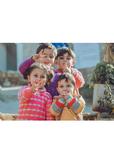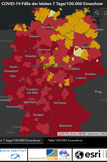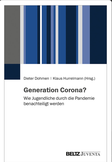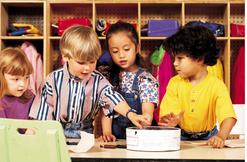I tell you my gender - you tell me who I am?
How to deal with gender diversity in education successfully
Surely you have heard that a real boy does not cry and a girl is not interested in technology. These are behaviors that are supposed to be typical of a person's gender. But of course every boy cries once in a while, and girls also dream of flying into space as astronauts. What impact do these societal views have on us and our children? We asked Jenny Wilken, trans mom and gender diversity expert.

There are more colors in the rainbow than blue and pink
"Humans need this gender classification to keep the world simple and press themselves into categories," says expert Jenny Wilken. We give ourselves and others a gender role with supposedly typical characteristics in order to find our place in society.
Our expert: Jenny Wilken is a freelance speaker and has been working in the field of gender diversity for over 10 years. This includes topics such as transsexuality/transidentity, trans parenting, feminism, homosexuality, encountering sexism and other exciting topics from the queer community. To educate or inform people, she regularly gives professional lectures at colleges and universities, among others. As a trans mom in a rainbow family, she has a very personal approach to this field and is committed with hand and heart to educate and against discrimination of people. You can find more information here: https://jennywilken.jimdofree.com/
Our expert:
Jenny Wilken is a freelance speaker and has been working in the field of gender diversity for over 10 years. This includes topics such as transsexuality/transidentity, trans parenting, feminism, homosexuality, encountering sexism and other exciting topics from the queer community. To educate or inform people, she regularly gives professional lectures at colleges and universities, among others. As a trans mom in a rainbow family, she has a very personal approach to this field and is committed with hand and heart to educate and against discrimination of people. You can find more information here: https://jennywilken.jimdofree.com/
https://jennywilken.jimdofree.com/
In many Western countries of the world we have capitalism as an economic form and heteronormativity as a social form. They confront us from an early age with unambiguous assignments: Blue for boys, pink for girls. Often it is even difficult to find baby clothes that do not follow this division. It continues with the furnishing of the nursery and with the consideration of which toys to buy. Dolls only for girls and cars only for boys?
In addition, children's books usually only tell of father-mother-child families; gender diversity and same-sex couples rarely appear. There is simply less money to be made with diversity than with products that can be manufactured and sold in large numbers according to a single pattern.
"It limits and can cause intense hurt when a person is not allowed to be who they are." - Jenny Wilken
Jenny Wilken warns of negative effects on a person's psyche. For example, boys and men who today wear supposedly typical female clothing such as dresses and skirts are often ridiculed. Yet 300 years ago, it was nothing unusual for men to show up with high heels and silk stockings, made-up faces and gorgeous clothes. "It would be desirable and extremely important for society to recognize that gender diversity exists and that there is nothing wrong with not being able or willing to assign oneself to one gender. The gender that's on your birth certificate can change throughout your life - it's not fixed."
If you look at the situation of transsexual children and adults or of intersexual persons, the problem becomes clear: How are they supposed to take their place in our two-divided society without falling out at the same time? The sex assigned at birth is not correct (transsexuality/transidentity) or no assignment could be made at birth based on the external characteristics, because the body has "male" and "female" characteristics (intersexuality). (intersex people).
The answer is: We have to make it clear to ourselves and our children that our society is not blue and pink. That it has always been wonderfully colorful. We do that through our language and the way we behave. "When the child goes to kindergarten or school, it becomes difficult to escape the pink princess world, then your child wants what the other children have. If your child then also wants a doll, he may. It's still important for parents to remain open to other things," says the expert.
Tips on inclusive language by Jenny Wilken:
- There is not only mom and dad: "An Elter" is a term for a parent and a gender-neutral term you can use. It's even in the dictionary!
- Make clear that every person, regardless of gender, is included in the language. You can do this with an asterisk (student), underscore (baker) or colon (scientist). Capital letters (e.g. CosmentikerIn) is not a correct gendering, because non-binary people (who cannot assign themselves to one of the 2 genders) are excluded. Better are therefore the 3 first-mentioned variants. Because language influences the thinking, so one makes clear that one thinks all humans with.
- In pronunciation, you simply make a small pause where the inserted punctuation mark would be. Example: Student pause
- Please write trans as an adjective, lowercase and separate from the noun.
Ideas for actions that take all genders into account:
- Let your child be who he or she wants to be. It's perfectly okay if your son likes to wear dresses and thinks pink glitter slippers are great. Or your daughter wears her hair short and her favorite pastimes are soccer and cars. There is nothing wrong with that
- Be open and consciously question gender stereotypes. It's okay to break away from stereotypes. This is often not easy and takes time, but it is never too late. It is an advantage if the educators in the daycare center and school support this view.
- Provide your child with cross-gender play opportunities. Toys that are fun for everyone: cars, dolls, workbench, play kitchen. There is also a range of neutral play materials that are not gendered, such as rag dolls without gender (Montessori dolls).
- Read diverse books with your children. As early as kindergarten age (3-6 years), you can look at children's books with your children that convey how different people can be. ( On 23.11.2020 an article about various children's books will be published in our magazine)
- Model what you want from and for your children. Maybe you have a rainbow family in your circle of acquaintances or a homosexual couple. Contact with different people enables children to never lose their openness at a very early age.
- Be relaxed about the topic of sex. Some people have a vagina and others a penis. It is important that you call the genitals by their names, they belong to them. Don't avoid your child's questions; an open approach is healthy. When children ask about it on their own, they are ready for the answer.
Gender diversity enriches us
You, your child, the neighbor or the boy with the dress at daycare - we are all wonderfully diverse people, with individual characteristics, traits and desires. And we all equally deserve to be seen and recognized as a person. The ability to approach ourselves and others with openness is what makes our society richer. Shame and exclusion, for example at school and at work, make people ill. That's why it's up to you: Be a role model. Give your children security. Children need an anchor that gives them support, cares for them and loves them as they are. Then they can accept themselves and live their lives.
We would like to thank Jenny Wilken for her cordial cooperation and her openness to this sensitive subject area and wish her all the best for her future!
Here you can find more information about transsexuality and intersexuality:
German Society for Transidentity and Intersexuality e.V.
Trans Kinder Netz e.V.
Federal Association Trans*
Association Intersexual People e.V
Published on
Topics
Articles on the topic
-
How do I find a school place for my child?
Depending on the state and type of school, different things need to be...

-
Childcare - how does it work in Germany?
The path from application to daycare place is simple and complicated at...

-
Controversy: open schools or close schools?
Politicians should react now to slide unprepared into a forced closure....

-
Corona pandemic severely disadvantages children and young people - but there is no "Corona generation"
This is a core finding of the anthology "Generation Corona? How young...

-
What to do after the Easter holidays? - Part 2: Final exams
An overview of the regulatory diversity

-
Kitas and schools in a state of flux
Update from 9.4.2021 on the current regulations
